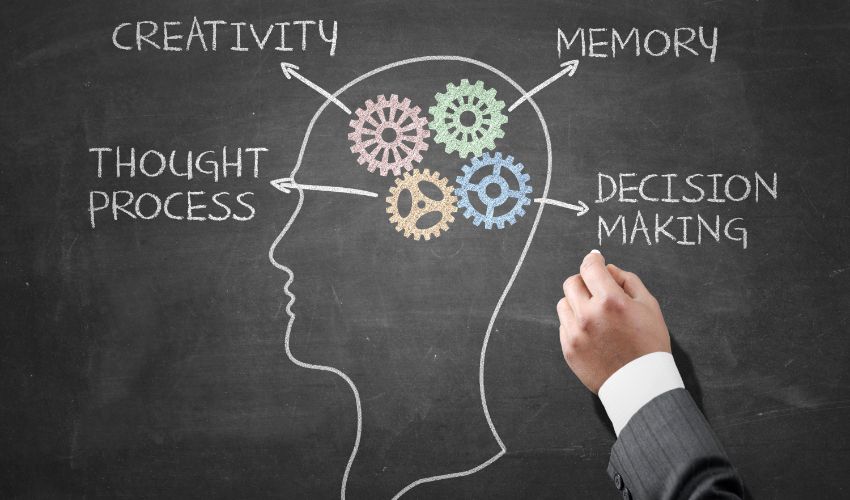Cognitive function refers to the ability of the brain to process and interpret information. It encompasses various mental processes, including perception, memory, attention, problem-solving, and decision-making. As we age, our cognitive function tends to decline, affecting our ability to perform daily activities and reducing our quality of life. However, cognitive function is not only determined by age, but it is also influenced by various lifestyle factors, such as diet, exercise, sleep, and stress management.
What is Cognitive Function?
Cognitive function refers to the mental processes that enable us to perceive, learn, remember, reason, and solve problems. It encompasses various domains, including:
- Perception: the ability to interpret sensory information from the environment, such as sight, sound, touch, taste, and smell.
- Attention: the ability to focus and sustain attention on a task or stimulus.
- Memory: the ability to encode, store, and retrieve information.
- Language: the ability to understand and use spoken and written language.
- Executive function: the ability to plan, organize, initiate, monitor, and control behavior and thought.
- Visuospatial function: the ability to perceive and manipulate spatial relationships and objects in the environment.
- Social cognition: the ability to understand and respond to social cues and emotions.
Factors Affecting Cognitive Function
Various factors can affect cognitive function, including:
- Age: Cognitive function tends to decline with age, especially after the age of 60.
- Genetics: Some genetic factors may affect cognitive function, such as the APOE gene, which is associated with Alzheimer’s disease.
- Lifestyle factors: Various lifestyle factors can affect cognitive function, such as:
- Diet: A diet rich in fruits, vegetables, whole grains, and healthy fats (e.g., omega-3 fatty acids) may promote cognitive function, while a diet high in saturated and trans fats may impair it.
- Exercise: Regular physical exercise may improve cognitive function by increasing blood flow and oxygen delivery to the brain, promoting neuroplasticity, and reducing inflammation and oxidative stress.
- Sleep: Sufficient and quality sleep is essential for cognitive function, as it promotes memory consolidation and neuronal repair and regeneration.
- Stress: Chronic stress may impair cognitive function by increasing cortisol levels, reducing neurogenesis, and promoting inflammation.

Tips to Improve Cognitive Function
Here are some tips to enhance cognitive function:
- Engage in mental stimulation: Activities that challenge your brain, such as learning a new language, playing a musical instrument, solving puzzles, and reading, may promote cognitive function by promoting neuroplasticity and strengthening neural networks.
- Practice mindfulness meditation: Mindfulness meditation may improve cognitive function by reducing stress, improving attention, and enhancing emotional regulation and self-awareness.
- Exercise regularly: Aerobic exercise, such as running, swimming, or cycling, may enhance cognitive function by promoting neurogenesis, improving blood flow and oxygen delivery to the brain, and reducing inflammation and oxidative stress.
- Eat a healthy diet: A diet rich in fruits, vegetables, whole grains, and healthy fats (e.g., omega-3 fatty acids) may promote cognitive function, while a diet high in saturated and trans fats may impair it.
- Get enough sleep: Aim for at least 7-8 hours of sleep per night and establish a regular sleep schedule to promote optimal cognitive function.
- Reduce stress: Engage in stress-reducing activities, such as yoga, meditation, or deep breathing exercises, to promote cognitive function by reducing cortisol levels and improving emotional regulation.
FAQs on Cognitive Function
Can cognitive function be improved with age?
Yes, cognitive function can be improved with age through various lifestyle interventions, such as physical exercise, mental stimulation, and a healthy diet.
Does cognitive function decline in everyone as they age?
No, cognitive function decline is not universal and can vary among individuals depending on various factors, such as genetics, lifestyle, and medical conditions.
Can cognitive function be improved after brain injury?
Yes, cognitive function can be improved after brain injury through various rehabilitation interventions, such as cognitive training, physical therapy, and occupational therapy.
Can medications affect cognitive function?
Yes, some medications may affect cognitive function, such as sedatives, anticholinergics, and opioids.
Can stress affect cognitive function?
Yes, chronic stress can impair cognitive function by increasing cortisol levels, reducing neurogenesis, and promoting inflammation.

Conclusion
Cognitive function is a vital aspect of our mental health and well-being, and it can be influenced by various lifestyle factors. By implementing the tips and strategies discussed in this article, you can enhance your cognitive function and maintain a sharper mind throughout your life. Remember to engage in mental stimulation, exercise regularly, eat a healthy diet, get enough sleep, and reduce stress to optimize your brainpower.






















